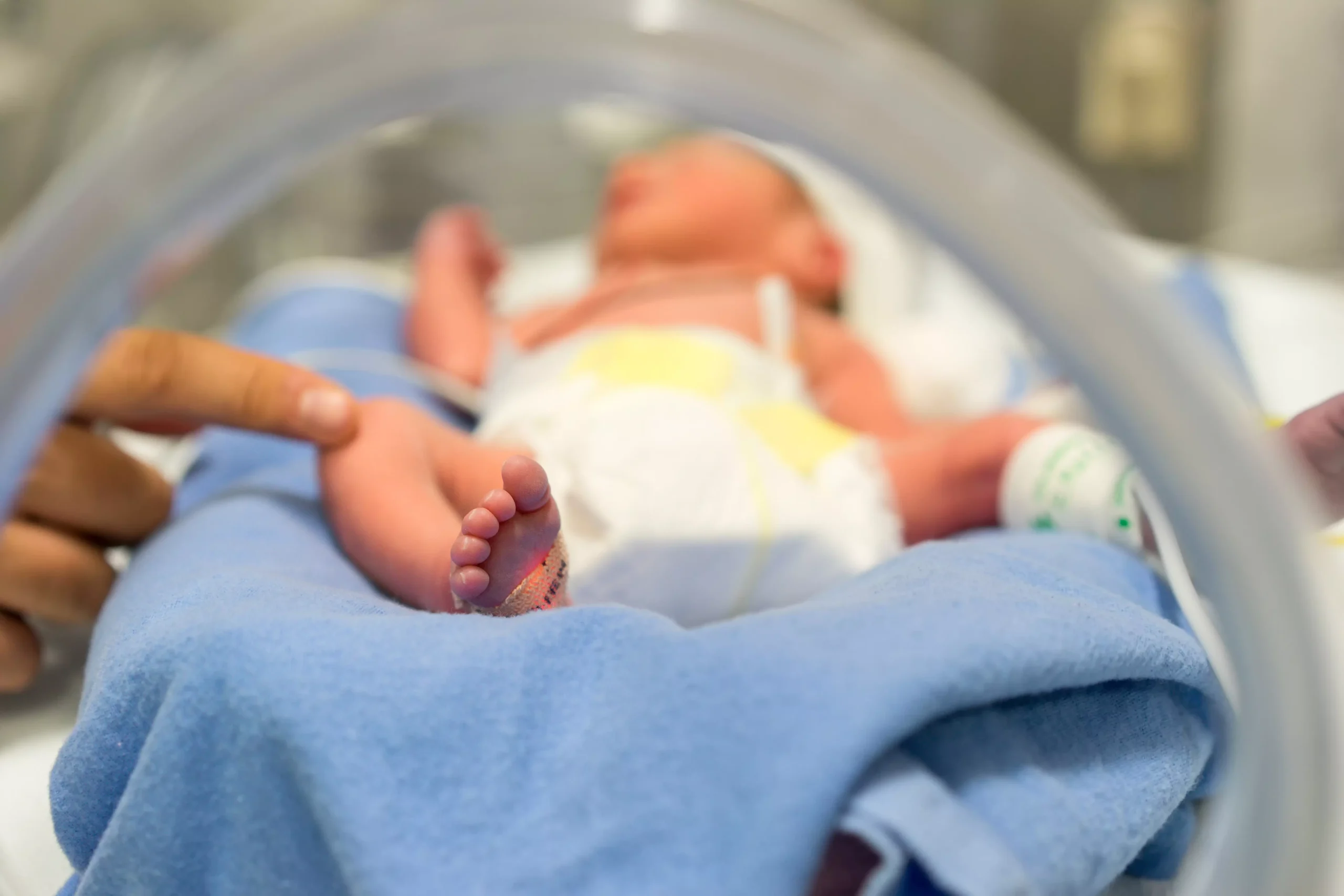Efficacy and safety profile
When prescribing any medication, understanding its safety and efficacy is crucial. To help you make informed prescribing decisions, this section offers information on key research supporting the use of caffeine citrate for managing AOP in clinical practice.
Always refer to the Prescribing Information and SmPC when prescribing PEYONA.

The Caffeine for Apnoea of Prematurity (CAP) trial
This trial highlighted the significant benefits of caffeine therapy in premature infants and is the largest trial to date using the combined rate of mortality and neurodevelopmental disability in survivors at a corrected age of 18 months as primary outcomes.
Conducted with 2,006 participants worldwide, this study found that caffeine effectively reduces the incidence of BPD and allows for earlier discontinuation of respiratory support. Caffeine therapy also improves survival rates without neurodevelopmental disabilities at 18 months and lowers the risk of cerebral palsy and cognitive delays. Long-term follow-up at five years showed no significant adverse effects.1–4
Summary of the data from the CAP trial and subsequent follow-up:1–4
Study Overview:
- Duration: 1999-2004
- Participants: over 2,000 infants with birth weights between 500 and 1,250 g
- Design: multi-centre randomised controlled trial (RCT) conducted across nine countries on four continents
- Intervention: caffeine citrate (20 mg/kg loading dose, followed by 5-10 mg/kg/day maintenance) versus placebo
Findings:
- Reduced risk of BPD: 36% in the caffeine group versus 47% in the placebo group (OR 0.63; 95% CI: 0.52-0.76; p<0.001)
- Earlier discontinuation of respiratory support: caffeine therapy led to earlier cessation of supplemental oxygen, CPAP, and mechanical ventilation.
- Reduced risk of persistent PDA: lower need for pharmacological or surgical closure in the caffeine group.
- Weight gain: temporary reduction in weight gain during the first three weeks, but no adverse effect on growth at discharge
Neurodevelopmental outcomes at 18 Months:
- Survival without disability: 40.2% in the caffeine group versus 46.2% in the placebo group (OR 0.77; 95% CI: 0.64-0.93; p=0.008)
- Reduced incidence of cerebral palsy: 4.4% in the caffeine group versus 7.3% in the placebo group (p=0.009)
- Reduced cognitive delay: 33.8% in the caffeine group versus 38.3% in the placebo group (p=0.04)
Post-hoc analysis:1-4
Mechanisms:
- Earlier discontinuation of positive airway pressure was identified as a key factor in improved outcomes. Infants receiving CPAP or mechanical ventilation experienced greater improvements in neurodevelopmental outcomes from caffeine therapy compared with those who received caffeine with no respiratory support
Long-term follow-up:
- 11-year follow-up for 1202 infants
- No significant improvement: no significant difference in survival without disability, death rates, behavioural problems, deafness or blindness between caffeine and placebo groups
- Significant improvement: significantly reduced risk of motor impairment in the caffeine group (19.7%) versus the placebo group (27.5%) (aOR 0.66; 95% CI: 0.48-0.90; p=0.009)
- No adverse long-term effects: caffeine therapy did not show long-term detrimental effects
Safety profile summary
The known pharmacology and toxicology of caffeine and other methylxanthines predict the likely adverse reactions to PEYONA.5
Common adverse reactions (≥1/100 to <1/10) described in the short- and long-term published literature and obtained from a post-authorisation safety study include hyperglycaemia, tachycardia, and infusion site phlebitis and inflammation.5
Treatment with caffeine citrate should be initiated under the supervision of a physician experienced in neonatal intensive care. Treatment should be administered only in a neonatal intensive care unit in which adequate facilities are available for patient surveillance and monitoring.5
Please refer to the summary of product characteristics for further details.
Abbreviations
aOR, adjusted OR; AOP, apnoea of prematurity; BPD, bronchopulmonary dysplasia; CI, confidence interval; CPAP, continuous positive airway pressure; IV, intravenous; NICU, neonatal intensive care unit; OR, odds ratio; PDA, patent ductus arteriosus; RCT, randomised controlled trial.
References
- Schmidt B., Roberts R.S., Davis P. et al. Caffeine therapy for apnea of Prematurity. N Engl J Med 2006;354:2112–21.
- Schmidt B., Roberts R.S., Davis P. et al. Long-term effects of caffeine therapy for apnea of prematurity. N Engl J Med 2007;357:1893–902.
- Davis P., Schmidt B., Robin R. et al. Caffeine for apnoea of premturity: Benefits may vary insubgroups. J Pediatr 2010;156:382–87.
- Schmidt B, et al. Caffeine for Apnea of Prematurity (CAP) Trial Group. Academic Performance, Motor Function, and Behavior 11 Years After Neonatal Caffeine Citrate Therapy for Apnea of Prematurity: An 11-Year Follow-up of the CAP Randomized Clinical Trial. JAMA Pediatr. 2017;171(6):564-572.
- PEYONA (caffeine citrate) SmPC. Available at https://www.medicines.org.uk/emc/product/4098/smpc. Accessed December 2024
IE-PEY-2400009 | December 2024
Adverse event reporting
For the UK: Adverse events should be reported. Reporting forms and information can be found at https://yellowcard.mhra.gov.uk/ or search for MHRA Yellow Card in the Google Play or Apple App Store. Adverse events should also be reported to Chiesi Limited on 0800 0092329 (UK) or PV.UK@Chiesi.com.
For Ireland: Adverse events should be reported to HPRA Pharmacovigilance – www.hpra.ie. Adverse events should also be reported to Chiesi Limited on 1800 817459 (IE) or PV.UK@Chiesi.com.